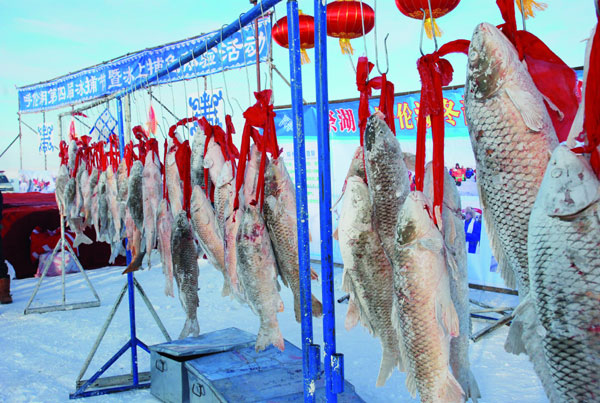Frozen lake holds fish treasures for Mongolians
Updated: 2013-01-14 10:23
By Xu Taotao (China Daily)
|
||||||||
Dozens of fishermen, all dressed in blue leather coats and broad red or green waist belts, kneel on the ice. Cheng Haijun, their leader, holds a bowl of liquor on his head and murmurs prayers for a good harvest and for the safety of all who have gathered here.
The 1.8-meter-tall Cheng wears the typical costume of local fishermen: a broad leather hat, a jade-colored belt and a pair of heavy knee-boots. Because their dress is similar to that of North America's Eskimos, the local people are dubbed "China's Eskimos".
After Cheng finishes his prayer, all of the fishermen stand up, drink liquor from their bowls, and then pour the remaining firewater onto the lake ice. This marks the beginning of this year's winter fish hunt.
Tractors pull caravans carrying fishermen toward the center of the lake, followed by winch trucks and vehicles used for hauling nets.
The first and critical step: Decide the point to set the nets. Based on his rich experience, Cheng judges the location of the school of fish and dictates where to broach the ice, making a large square ice hole.
From that point, the men dig 10 small ice holes, about 30 meters apart, in a straight line. Then a second row of 10 holes is dug from the same starting point, but this time at an angle of 135 degrees from the first line.
To open the net beneath the ice, the men feed it from hole to hole using a 30-meter guiding rod. It's like a huge needle dragging the 800-meter-long fishing net along.
The men use a special tool to steer the rod through the ice holes they have dug. It's a rigorous and tough endeavor, says veteran Liu Hongguo, who has been doing that part of the job for 10 years. The fishing net spreads out like a big fan in the lake.
Then comes the most exciting moment: harvesting the fish. At about 1 pm, tractors pull the winch and close the net. Cheng estimates that the haul below is at least one ton of fish, a typical catch.
As thousands of fish leap out of the ice hole, their scales glistening in the sunshine, the crowd cheers wildly. Celebration and laughter spreads across the lake.
Tossing fish in the air is another exciting scene. In the -30 C cold, fish will be frozen into an ice pile seconds after they are captured - not convenient for transportation.
So, while four fishermen toss the leaping fish from the net to the icy ground, another group of fishermen immediately shovels the fish and tosses them high into the air so they will dry before the water on them freezes. The smells, shadows and colors of glistening fish overpower the senses.
Normally, the winter fishing season lasts for several months and the amount of fish harvested from the period accounts for about 80 percent of the whole year's yield.
"In other months, fishing is forbidden to protect resources," Cheng says.
Then the community will turn to summer activities, with a stockpile of cured and dried fish, and wait for the ice to come again.
xutaotao@chinadaily.com.cn
 |
 Rare panda cub plays to the gallery at San Diego Zoo |

 'Taken 2' grabs movie box office crown
'Taken 2' grabs movie box office crown
 Rihanna's 'Diamonds' tops UK pop chart
Rihanna's 'Diamonds' tops UK pop chart
 Fans get look at vintage Rolling Stones
Fans get look at vintage Rolling Stones
 Celebrities attend Power of Women event
Celebrities attend Power of Women event
 Ang Lee breaks 'every rule' to make unlikely new Life of Pi film
Ang Lee breaks 'every rule' to make unlikely new Life of Pi film
 Rihanna almost thrown out of nightclub
Rihanna almost thrown out of nightclub
 'Dark Knight' wins weekend box office
'Dark Knight' wins weekend box office
 'Total Recall' stars gather in Beverly Hills
'Total Recall' stars gather in Beverly Hills
Most Viewed
Editor's Picks

|

|

|

|

|

|
Today's Top News
Boston bombing suspect reported cornered on boat
7.0-magnitude quake hits Sichuan
Cross-talk artist helps to spread the word
'Green' awareness levels drop in Beijing
Palace Museum spruces up
First couple on Time's list of most influential
H7N9 flu transmission studied
Trading channels 'need to broaden'
US Weekly

|

|








